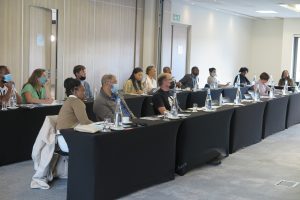
Co-developing evidence-based policy learning for supporting energy services delivery in South Africa’s informal settlements
10 August 2022
Co-developing evidence-based policy learning for supporting energy services delivery in South Africa’s informal settlements
In early 2022, Professor Caprotti and Dr Bobbins collaborated with the ‘Low‐Income Energy Services unit’ within the City of Cape Town Sustainable Energy Markets Department. Here, they aimed to establish evidence‐based policy learning to support energy services delivery in South Africa’s informal settlements. The unit wanted to address the challenges of providing energy to informal settlements, but they would have to overcome technical, social, financial, and infrastructural issues.
During the research stages, they identified key gaps in evidence-based policymaking on energy service delivery to informal settings. This needed to change, and the City of Cape Town were on board for positive changes, which addressed the gaps and supported new partnerships.
“Policymaking cannot happen in a vacuum”, so it was important for the researchers to contact and develop a network of academics and stakeholders. They did this by creating a contacts database that was able to be shared amongst their policy group.
Some project costs were utilised in several key ways, including updating the current website, producing a virtual site visit video and delivering workshops. For evidence-based policymaking in areas of energy and urban developments to be effective, it needs to be able to engage with evidence at a local scale. A local graphic designer was employed to structure and layout the information produced by the researchers, PI and Co-I, which could be disseminated online through Twitter, LinkedIn and the research collective website. Posting regularly on social media was also beneficial as it allowed their policy briefs to be both locally impactful and easily accessible.
A local filmmaker was hired to produce films of everyday life in rural South Africa. This created a unique experience for policymakers, helping them to immerse themselves within the location while collaborating from the UK during one of the workshops. Engaging with policymakers cannot be understated; the workshops allowed researchers, local experts and policymakers to meet, mingle and hold meaningful discussions, sharing information between each party. They found that a key benefit of working with policymakers is the practical findings that address real concerns. Those valuable insights aided the development of solar mini-grids in informal settings, such as placement towers monitoring use and the value of solar energy.

Policy workshop held in Cape Town, May 2022
Interdisciplinary working is a key starting point for academic research. Working with policymakers helped them respond to the complex problems that exist between academia and practice. It also enabled them to establish long-term, sustainable working relationships with local communities and with local NGOs, academia, and the private sector. Interdisciplinary working has immense value for overcoming place-based challenges, and their relationship network enabled a smoother information flow.
In early 2022, the project was presented to Her Highness Nomatemba Tambo, the UK’s High Commissioner to South Africa.
For more information please contact:
For more information on this project, please contact Dr Caprotti on F.Caprotti@exeter.ac.uk
Want to harness policy in your research? Please visit Policy@Exeter.
This project was supported by Policy Support Funding. To find out more about funding opportunities at the University of Exeter, please visit Translational Funding.




